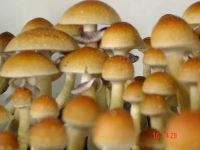Psilocybin decreases brain blood flow and connectivity
 |
Psychedelic drug users throughout the ages have described their experiences as mind-expanding. They might be surprised, therefore, to hear that psilocybin -- the active ingredient in magic mushrooms -- actually decreases blood flow as well as connectivity between important areas of the brain that control perception and cognition.
The same areas can be overactive in people who suffer from depression, making the drug a potential treatment option for the condition.
The study is the first time that psilocybin's effects have been measured with fMRI, and the first experiment involving a hallucinogenic drug and human participants in the UK for decades.
Robin Carhart-Harris at Imperial College London and colleagues recruited 30 volunteers who agreed to be injected with psilocybin and have their brain scanned using two types of fMRI.
Half of the volunteers had their blood flow measured during the resulting trip; the rest underwent a scan that measured connectivity between different regions of the brain.
Less blood flow was seen in the brain regions known as the thalamus, the posterior cingulate and the medial prefrontal cortex. "Seeing a decrease was surprising. We thought profound experience equalled more activity, but this formula is clearly too simplistic," says Carhart-Harris. "We didn't see an increase in any regions," he says.
Decreases in connectivity were also observed, such as between the hippocampus and the posterior cingulate and medial prefrontal cortex.
"Under psilocybin you see a relative decrease in 'talk' between the hippocampus and these cortical hub regions," says Carhart-Harris. "Changes in function in the posterior cingulate in particular are associated with changes in consciousness."
[Thanks layne_says!]
|

Recently @ DoseNation
|
|






















What are you talking about?
No one lost any blood. There was no clotting or brain damage.
Anyway, science does not have the tools to find the ghost in the machine.
@EPORT-I read quotes by those gentlemen you suggested. Doesn't change that fact that blood loss to the brain doesn't expand/open/clear consciousness, it shuts it off. (i.e a stroke, ischemia). Similarly, your heart doesn't expand when you have a lack of blood pumping to it, you have a heart attack resulting in possible death. No superstition involved here, just science. Philosophize your way around those facts. Syskil-3, Drug Users-0
I know I could get flack for this but this probably shows that's it is an adjuctive therapy to cancer perhaps? If metasticies happen from tumors getting angiogenisis... Anyways that's just brainstorming while stating something that is obvious.
Dosnt also opiates decrease bloody ow, if I was in terminal cancer which is painful, I'd want that!
Hoping for more psychedelic drug comparisons.
The comments posted here do not reflect the views of the owners of this site.